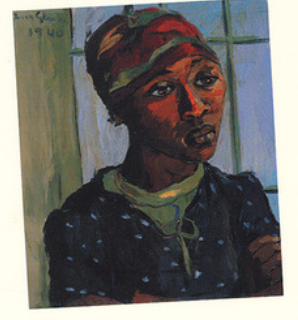The novel coming to birth is a story that follows a young girl called Paulina as she grows and matures into adulthood. Paulina’s story is narrated alongside that of Kenya’s struggle for independence. The story also features real political figures in Kenyan history including Jomo Kenyatta, Argwings Kodhek, and Tom Mboya, and real historical events which include the assassinations of Argwings Kodhek and Tom Mboya, and Jomo Kenyatta became the first prime minister of independent Kenya. There is also the mention of Mr. Moi who later became Kenya’s second president, Ronald Ngala, and Chelagat Mutai, one of the few women MPs at the time.
Plot
The story begins with Martin Were waiting at the train station to receive Paulina. Martin who is twenty- three years old is married to Paulina, a sixteen-year-old girl from the village. Paulina is pregnant during this time but she has not revealed it to Martin yet. Martin is depicted as a young, hardworking, successful man who works at a shop selling envelopes. Paulina loses the baby a few days later and this is the onset of the conflict that will later lead to the couple’s separation. Paulina goes back to Kisumu where she joins a school to learn about sewing and home keeping and she does so well that she is appointed as a community leader. Meanwhile, Martin is in Nairobi engaging with other women, although he comes home to Paulina once in a while but is disappointed each time because there are no signs of a baby. Martin justifies his infidelity by saying that he has a right to have a child. Paulina begins having relations with Simon who is also married. The story reaches a climax when Martin beats and denounces and disowns Paulina after learning of her affairs with Simon. Both then live their separate lives, completely cutting contact with each other. Both of them go through challenges and experiences differently, including Paulina giving birth to a son and then having him die in her hands from a gunshot wound, and Martin being unsuccessful in trying to get a child with other women. The two eventually become friends again when Paulina moves back to Nairobi to work for Mr. and Mrs. M and they resolve to get back together. This happens alongside Kenya’s growth towards independence.
Setting
The events in the text take place during the colonial through to postcolonial Kenya. The story mainly takes place in various parts of Nairobi and Kisumu.
Characters and characterization in coming to birth
Paulina
Paulina is the main character in the text as the story mainly revolves around her.
Paulina is naïve as seen at the beginning of the text. She is a young teenage girl who arrives in the city unaware of how city life works. She does not know how to light the charcoal stove as she is used to firewood back in the village. Paulina also does not know how the toilet works because back in the village they do their business in the bush.
Paulina is superstitious. While they are heading to Martin’s house from the train station, Paulina comes across the building where the Indians keep their dead and she considers it as a bad omen. Paulina associates the building with something bad although other people do not see it that way.
Paulina is traditional. We are told that Paulina is afraid of spitting a little bit of the water she was drinking as a ritual because she is afraid of making the floor dirty. The act of spitting water is customary and is a way of appeasing the ancestors. Paulina also wonders if she will have to share the same bed with her husband because she is accustomed to husbands and wives sleeping separately.
Paulina is submissive as seen when she leaves the hospital after being ordered by the nurses because she is used to following orders. This is despite the fact that she does not know her way back home. She is also submissive towards her husband even when he is abusive towards her.
Paulina is resilient. Throughout her lifetime, Paulina faces many challenges but she faces them and comes out stronger. She experiences several miscarriages but she is able to move on with life. When she separates from Martin, Paulina is able to make a life for herself and become an independent woman
Martin Were
Martin Were is Paulina’s husband. He is introduced to the text as an educated and successful young man who belongs to the working-class citizens in colonial Kenya.
He is knowledgeable. We are told that Martin attends evening classes in English and bookkeeping to get a promotion at work. Aside from that, Martin is also educated and can read and write, and supports Paulina to learn how to read and learn Swahili.
Martin is abusive. There are many instances where Martin abuses Paulina both physically and verbally after she leaves the hospital and gets lost in the city. Martin accuses Paulina of sleeping around while calling her slurs (whore, slut, bitch) as he hits and kicks her. He also beats Paulina when he learns that she has been sleeping with Simon.
Martin is also short-tempered. He gets angry at Paulina quickly without listening to her explanations. For example, he gets angry when he comes back to the house and finds no food because he locked Paulina inside the house preventing her from cooking any food.
Rachael
Rachael is a neighbor and friend to Paulina. She is the second person to meet Paulina in the city after Martin.
She is caring. She brings food to Paulina on her first day in the city and warns Paulina against the dangers of the city.
Rachael is also motherly. She worries that Paulina is too young to be someone’s wife, let alone carrying a child. When Paulina feels unwell Rachael looks for a vehicle that will take Paulina to the hospital.
Other Characters in Coming to Birth
Simon
A married man who has sexual relations with Paulina resulting in her pregnancy
Ahoya
A Christian woman who speaks Paulina’s language and helps in ensuring Paulina’s wellbeing
Susana
A Christian woman in Nairobi who houses Paulina the first day she is lost. She is kind as helps to feed and house Paulina when she is lost, even though she is a stranger.
Fatma
Fauzia
Mr. M (an MP)
Mrs. M
Themes in Coming to Birth
Change
Change is one of the major themes in the text with several instances. Paulina experiences change when she moves from rural to urban life which is completely different from what she is used to, and is forced to adapt to it. We also see a change in Paulina from being an ignorant and naïve young girl to becoming a fully grown woman who is independent and is able to make her own decisions.
Martin Were goes through change as well. He grows from being an optimistic and energetic young man who does not respect his wife, to losing interest in many of the things that once interested him, and finally, to respecting and admiring Paulina for the woman she has become.
Male dominance
Male dominance is largely driven by a patriarchal society in which the social ideologies place women at a lower position in society. As in many African literary texts, the theme of male dominance is a major issue. Men hold dominant positions and positions of privilege in society. All the positions of power and politics are majorly occupied by men. Mr M., for example, works in the government. Men like Martin Were are able to work while women stay at home to look after the kids and cook for their husbands.
Male dominance is also seen where Paulina is put to shame for looking for comfort and wanting a baby with another man, yet no one speaks about Martin’s infidelity even when Paulina was a faithful wife to him. Martin gets angry at Paulina for being with another man when he himself has been with other women without Paulina complaining although she knows about it. Paulina’s mother-in-law grows cold at her but says nothing about her son’s infidelity.
Disillusionment
Disillusionment refers to a feeling of disappointment as a result of discovering that something is not as good as one believed it to be. Martin Were is a strong follower of Kenyan politics and he becomes disillusioned when the politics of the country seems to deteriorate despite looking promising earlier. Martin’s favorite politician Tom Mboya is assassinated alongside other leaders. This also affects the rest of the citizens.
Colonialism
The story takes place during the colonial period and the postcolonial period. People from the KEM communities (Kikuyu, Embu and Meru) are on a curfew because some members from these communities are fighting against the British colonial government. There is the mention of young British boys lining the roads with guns in their hands. Kenya is also on its way to independence
Adultery
Adultery refers to consensually having sexual relations with other people despite being married. Martin indulged in adultery when he sleeps with Fauzia who then shamelessly makes fun of Paulina for being childless. Paulina has sexual relations with Simon and sires him a son despite still being married to Martin, although they are separated. Simon also cheats on his wife with Paulina despite them knowing each other.
Perseverance
The theme of perseverance greatly dwells on Paulina. The texts present Paulina’s struggles through an abusive and childless marriage to having her child killed in her arms by a gunshot. Despite all these challenges Paulina gets back on her feet and moves on with life. No ordinary woman would be able to endure what Paulina has endured and still manage to stand strong.
Martin Were also perseveres as he studies extra time to get promoted at work. He also endures going without a midday snack to save money to pay off debts and take care of Paulina.
Religion
Christianity is a dominant religion in the text. Paulina encounters Susana and Ahoya who are dedicated Christian women when she is lost in the city. She manages to convince Martin to have their wedding officiated in the church and Martin even bought Paulina a bible. During her training back in Kisumu Paulina attends the church and we are also told about several conflicts in the church. The women are trained to become Christians.
Islam is a less dominant religion in the text, but worth mentioning. Amina is a Muslim woman who adopts Joyce and takes her to be baptized in the church according to her Christian mother’s wishes. Fauzia is also a Muslim girl who stays with Martin in Nairobi.
Women Empowerment
Mcgoye presents the female characters in the text as strong women. A good example is Paulina who, although initially was a meek little girl, becomes empowered as the story progresses and becomes a strong and independent African woman. Paulina is also helping other women from her community to become empowered and she supports her mother-in-law and parents financially. She is able to make her own decisions as seen when she asks Simon to leave after she gets pregnant by him and does not expect any help from him in raising her son. Paulina works hard and makes those close to her proud to be associated with her.
Freedom
The text presents two levels of freedom. The first level is Paulina’s freedom. In the beginning, Paulina is a young girl who is unable to decide for herself and has to bend to the will of others. She is required to submit to her husband but as the story progresses Paulina becomes a grown woman. Paulina becomes free from her husband and societal constraint and is able to choose how she wants to live her life. Paulina also becomes free from the “curse” of childlessness when she becomes pregnant with Okello after several years of failing to carry a child to full term or failing to conceive in her marriage to Martin.
The second level of freedom is that of Kenya as it moves from being a colony of Britain to an independent country. There is the mention of Kenya’s independence several times in the book, as well as the mention of Jomo Kenyatta who was the first prime minister and then president after Kenya gained independence.
Betrayal
Betrayal is seen several times in the text between several people. The first betrayal is Martin’s towards Paulina. Martin betrays Paulina’s love for him by beating her constantly and later cheating on her with several women. Paulina also betrays her sanctity to her marriage by having sexual relations with Simon which results in Paulina’s first successful pregnancy. Simon betrays Martha’s love by sleeping with Paulina, and Paulina betrays Martha’s friendship with her by sleeping with her husband despite knowing that he is married.
There is also betrayal in politics. The citizens of Kenya feel betrayed by their leaders who order for assassinations of other leaders. The people were hopeful that the country would change after Kenya becomes independent but they are disappointed that it remains the same as it was during colonialism, with only a small number of people, especially those in government, benefiting.
Misfortune
There are several instances of misfortune in the text. Paulina encounters her first misfortune when she has a miscarriage for her first pregnancy. She then gets lost after being released from the hospital which leads to her getting beaten by Martin. Another misfortune met by Paulina is in the death of her son Okello in her arms during the riots in Kisumu. Martin also encounters misfortune as he is unable to sire a child with any of the women he is with.
Kenya encounters misfortunes with the assassinations of some of her most promising politicians including Tom Mboya. There are also riots as a result of these assassinations which lead to political instability in the country.
Education
The theme of education features prominently in the text, whether formal or informal. In the beginning, Martin is described as an educated and successful man who attends evening classes for English and bookkeeping. Paulina also learns how to read and speak Swahili and later on joins a school for the home craft. Schoolchildren are mentioned severally in the text which signifies that education is an important part of Kenyan society. Martin’s sisters attend school because Martin is required to pay for their education. Nancy, with whom Martin is having an affair, is described as a young girl who was forced to leave school after getting pregnant and could not join another one because her mother could not raise the money required. Even the Kenyan politicians including Tom Mboya, Jomo Kenyatta, and Mr. M are educated.
Literary devices
Personification
The train has been personified when it is mentioned that “the train swept” to mean that the train moved along
“Rushing traffic” is also used to signify that traffic was moving quickly.
Alliteration
“Hussle and bussle” are rhyming words.
“Sickly calf”
“Sickly sweet smell” creates a sense of musicality.
Synecdoche
This is a figure of speech where a part of something is made to represent the whole
Mcgoye writes that Paulina has not learned the town capacity to mean that the city was too big for Paulina to master, resulting to her getting lost.
The writer mentions that people were pouring down the road on foot or bicycle to mean that people were busy traveling to and fro in the city.
Flashback
This is the transition of a story to an earlier time or recall of events that happened in the past.
The narrator takes us back to life in the village when Paulina arrives at the city and experiences completely different living conditions
There is also a flashback when, in the event of her father’s death, Paulina recounts her father’s life as he worked on a sisal farm in a place beyond Nairobi.
Dialogue
There are instances of dialogue throughout the novel.
Mcgoye uses quotation marks to indicate that the characters are conversing. For example,
then s woman’s voice called in her own language, ‘May I come in?’
‘who are you?’ she asked trembling.
‘my name is…….’
Allegory
a story, poem, or picture that can be interpreted to reveal a hidden meaning, typically a moral or political one
Mcgoye uses Paulina as a metaphor of Kenya as a young nation trying to chart its own path.
Paulina’s journey of growth represents Kenya’s growth to freedom and independence.
Martin and Paulina’s marriage is in tune with Kenya’s peace whereas they are having misunderstandings in their marriage Kenya is also experiencing chaos and stabilizes when Paulina and Martin are finally stable in their marriage.
Onomatopoeia
Paulina was jolted awake by someone banging their petrol cans
Boots clanging
Bang! Bang! during the riots
All these words imitate the natural sounds that are produced by the objects they represent.




